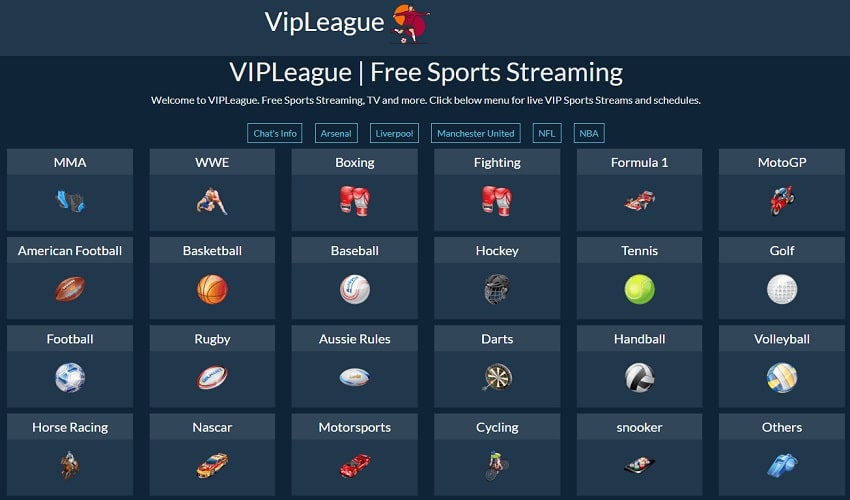In the dynamic world of online sports streaming, VIPLeague stood as a prominent platform, providing millions of sports enthusiasts with access to live streams of various sporting events. However, its sudden shutdown has left many fans dismayed and curious about the reasons behind its closure. In this article, we delve into the rise and fall of VIPLeague, exploring the factors leading to its shutdown and the implications for the online sports streaming landscape.
The Rise of VIPLeague: A Fan’s Paradise
VIPLeague emerged as a go-to destination for sports fans seeking free and accessible live streams of their favorite games. With a user-friendly interface and a wide range of sporting events, from football to basketball, cricket to tennis, VIPLeague catered to diverse tastes and preferences. Its popularity soared as viewers appreciated the convenience of accessing live sports without the constraints of traditional television subscriptions or geographical limitations.
The platform’s appeal extended beyond its extensive sports coverage. VIPLeague fostered a sense of community among fans, providing chat rooms and forums where enthusiasts could engage in discussions, share insights, and connect with like-minded individuals from around the globe. This social aspect enhanced the overall viewing experience, turning passive consumption into active participation.
The Downfall: Legal Challenges and Technical Hurdles
Despite its popularity, VIPLeague faced persistent challenges from legal authorities and copyright holders. The unauthorized streaming of copyrighted content drew scrutiny and legal action, leading to frequent domain changes and takedowns. While VIPLeague attempted to navigate these legal obstacles by relocating to different domains and employing various countermeasures, the battle against copyright infringement proved to be an uphill struggle.
Moreover, technological advancements in content protection posed additional hurdles for VIPLeague. As streaming services and sports leagues invested in robust anti-piracy measures, such as digital rights management (DRM) and watermarking technologies, the task of circumventing these defenses became increasingly complex. VIPLeague’s efforts to maintain a reliable streaming service while evading detection became increasingly untenable, ultimately contributing to its downfall.
Impact on the Streaming Landscape: Lessons Learned
The closure of VIPLeague underscores the broader challenges faced by the online sports streaming industry. While platforms like VIPLeague cater to the demands of consumers seeking free and convenient access to live sports, they also operate within a legal and regulatory framework that prioritizes the protection of intellectual property rights. Balancing the interests of content creators, rights holders, and consumers remains a delicate endeavor, requiring innovative solutions and collaborative efforts from all stakeholders.
Furthermore, the demise of VIPLeague highlights the importance of adaptability and resilience in the face of evolving technological and legal landscapes. As streaming platforms continue to proliferate and competition intensifies, sustainability hinges on the ability to stay ahead of regulatory developments and invest in legitimate business models that align with industry norms and standards.
The Future of Online Sports Streaming: Towards a Sustainable Ecosystem
As fans lament the loss of VIPLeague and seek alternative streaming options, the industry is at a crossroads. While the closure of VIPLeague may signal the end of an era, it also presents an opportunity for reflection and reinvention. Moving forward, stakeholders must collaborate to establish a sustainable ecosystem that balances the interests of all parties involved.
Legitimate streaming services, supported by partnerships with sports leagues and broadcasters, offer a promising path forward. By providing affordable subscription-based models with access to high-quality content and enhanced viewing experiences, these platforms can attract and retain customers while generating revenue for rights holders. Moreover, embracing technological innovations, such as blockchain-based authentication and decentralized streaming protocols, can bolster security and transparency, mitigating piracy and fostering trust among users and content creators alike.
Conclusion
The shutdown of VIPLeague serves as a sobering reminder of the challenges inherent in the online sports streaming landscape. While its closure may leave a void for fans accustomed to its services, it also presents an opportunity for the industry to evolve and innovate. By embracing legitimate business practices, investing in technological solutions, and fostering collaboration among stakeholders, the future of online sports streaming can be one of sustainability, accessibility, and integrity.
